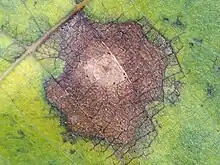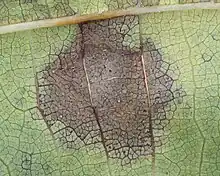| Gnomonia leptostyla | |
|---|---|
 | |
| Topside view of a Juglans regia leaf infected by G. leptostyla | |
 | |
| Underside view of a Juglans regia leaf infected by G. leptostyla | |
| Scientific classification | |
| Domain: | Eukaryota |
| Kingdom: | Fungi |
| Division: | Ascomycota |
| Class: | Sordariomycetes |
| Order: | Diaporthales |
| Family: | Gnomoniaceae |
| Genus: | Gnomonia |
| Species: | G. leptostyla |
| Binomial name | |
| Gnomonia leptostyla (Fr.) Ces. & De Not., (1863) | |
| Synonyms | |
|
Gloeosporium juglandis (Lib.) Mont., (1849) | |
Gnomonia leptostyla is a fungal plant pathogen. It is newly named Ophiognomonia leptostyla and occurs on walnut (Juglans spp.) and causes leaf blotch and leaf spots which is called walnut anthracnose or walnut black spot. The anamorph is Marssoniella juglandis.[1]
References
- ↑ Sogonov MV, Castlebury LA, Rossman AY, Mejia LC, White JF (2008). "Leaf-inhabiting genera of the Gnomoniaceae, Diaporthales". Studies in Mycology. 62: 1–79. doi:10.3114/sim.2008.62.01. PMC 2621335. PMID 19287541.
External links
This article is issued from Wikipedia. The text is licensed under Creative Commons - Attribution - Sharealike. Additional terms may apply for the media files.